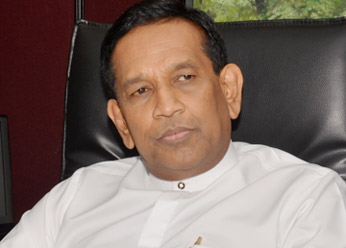|
13th Amendment, pluses and minuses:
A solution acceptable to all communities must be in place
by Uditha Kumarasinghe
 Co-Cabinet spokesman and Minister of Health Dr.Rajitha Senaratne said
whether the issue was the 13th Amendment or 13 plus it had to be
thrashed out after extensive discussions with all sections of the
country. The Minister in an interview with the Sunday Observer said that
those who make a big hue and cry about the 13th Amendment and devolution
of power have no proper understanding of the subject. They have what is
known as the ‘island mentality.’ They don’t know what is happening
outside the confines of the island. Co-Cabinet spokesman and Minister of Health Dr.Rajitha Senaratne said
whether the issue was the 13th Amendment or 13 plus it had to be
thrashed out after extensive discussions with all sections of the
country. The Minister in an interview with the Sunday Observer said that
those who make a big hue and cry about the 13th Amendment and devolution
of power have no proper understanding of the subject. They have what is
known as the ‘island mentality.’ They don’t know what is happening
outside the confines of the island.
Excerpts:
Q: Is the National Unity Government
determined to fully implement the 13th Amendment or go for the 13 plus?
A: We have to discuss that
with all sections and implement some solution acceptable to all
communities.
Q: It is commonplace to say that the
13th Amendment was foisted on Sri Lanka by the Rajiv Gandhi Government.
What are your views?
A: Those who said so are
also in the Provincial Councils. If the 13th Amendment was put on our
shoulders by force, why do they represent Provincial Councils? Those who
said so including Wimal Weerawansa boasted that they were the ‘remote
controls’ of the Provincial Councils. Udaya Gammanpila not only became a
Provincial Council member but also a Minister in it. He enjoyed the
privileges and appointed his wife as his private secretary. He also
supported certain measures giving more powers to Provincial Councils.
They are the same people who talk about the UNHRC Resolution.
Q: Since 1987, all previous
governments were hesitating to fully implement the 13th Amendment
regarding Police and land powers. Why is this?
A: This is not an issue.
The recent UNHRC Resolution too has underlined the need to facilitate
Provincial Councils under the 13th Amendment. That is all.
Q: The notion of the 13th Amendment
stemmed from the Indian government’s desire to satisfy a group of
blood-letting terrorists who knew no democracy or devolution of power.
Would you agree?
A: This is not so. If
there was an agreement, the LTTE never adopted it. They went back on the
agreement. Actually, this agreement was accepted by all other 18 armed
groups and they handed over weapons and entered into mainstream
democracy by accepting the unitary status of Sri Lanka. The agreement
was confined to these armed groups and the Indian and Sri Lankan
governments.
Q: Many scholars and academics feared
the 13th Amendment as it would disseminate the seeds of separatism
inspired by the 50 million Tamil Nadu Tamils. Your views?
A: Power has been devolved
in most countries, but there had not been separatism. Is there a country
separated after devolution? Not even a single country. Countries which
had a unitary form of government too were separated.
Q: Devolution of power is not
conducive to a small country such as Sri Lanka tormented by moral and
physical support by Tamil Nadu extremists. Would you agree?
A: Even Pondichery in
India is a separate state. What is the size of Pondichery compared to
Sri Lanka? Switzerland is smaller than our country. But they have also
effected devolution of power successfully. Therefore, the size of a
country is immaterial in the context of devolution.
Q: Devolution of power has succeeded
in countries where the Central Government is militarily powerful to
check any separatist elements in the initial stages itself. Your views?
A: What is the strength of
military power in Switzerland or the Nordic countries? Those who raise
this issue have no understanding of the devolution of power. They think
this island is the entire world and which is known as the ‘island
mentality.’ They don’t know what is happening outside the confines of
the island.
Q: The 13th Amendment is merely a
constitutional device to satisfy Tamil extremists. To be valid, it
should have been endorsed at a Referendum. Could you explain?
A: These very same people
who said so projected the late Prime Minister S.W.R.D. Bandaranaike as a
Sinhala hero. But he was the first politician who wrote to the Ceylon
Leader newspaper that the best system of governance for Sri Lanka was
federalism. What is more, the first people who proposed federalism to
the Donoughmore Commission were the upcountry Sinhala Buddhists, not the
Tamils. At that time, the Tamils opposed federalism. |

